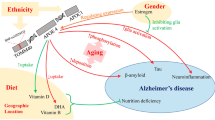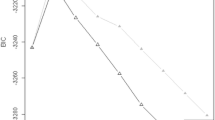Abstract
The APOE*4 allele of the apolipoprotein E gene increases the risk of Alzheimer’s disease (AD), but whether it also affects the course of the disease is controversial. However, all studies on this issue until now have been based on patients at various stages of disease. In the present population-based study, 97 patients were included at a similar stage, i.e., before the onset of symptoms, and followed for up to 5 years. We found that the APOE*4 allele is not a strong determinant of survival in AD. As change in cognitive function and severity of dementia are similar for AD patients with and without APOE*4, our study suggests that progression of AD is not related to the APOE*4 allele.
Similar content being viewed by others
Author information
Authors and Affiliations
Additional information
Received: 17 June 1998 Received in revised form: 8 September 1998 Accepted: 9 September 1998
Rights and permissions
About this article
Cite this article
Slooter, A., Houwing-Duistermaat, J., van Harskamp, F. et al. Apolipoprotein E genotype and progression of Alzheimer’s disease: the Rotterdam Study. J Neurol 246, 304–308 (1999). https://doi.org/10.1007/s004150050351
Issue Date:
DOI: https://doi.org/10.1007/s004150050351




